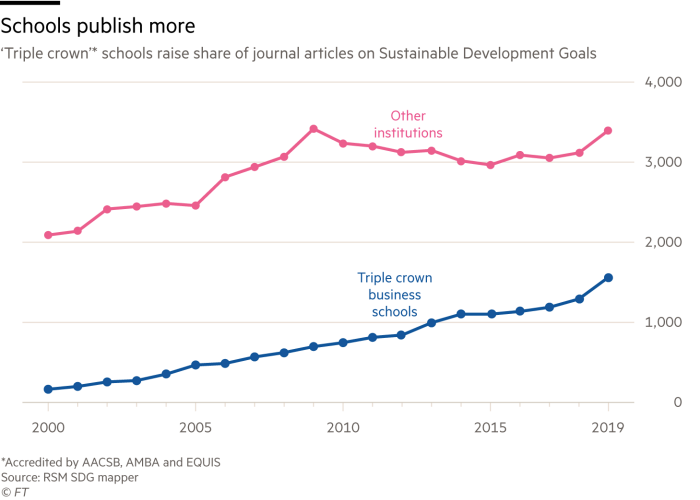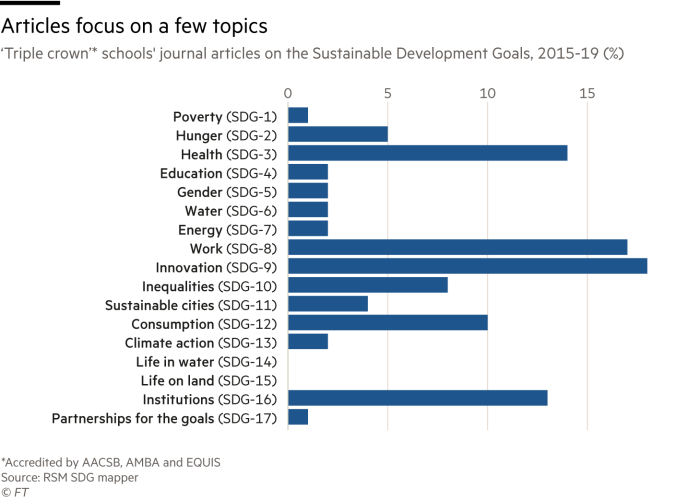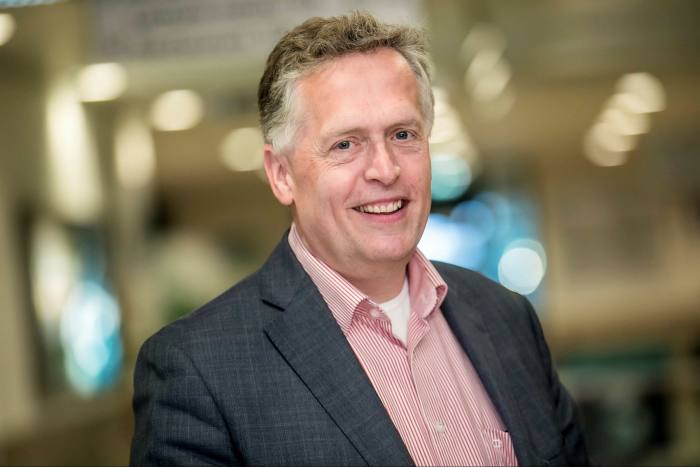Weighing up business schools’ work on sustainability
Wilfred Mijnhardt has a issue. Europe is property to some of the world’s oldest and most prestigious business colleges, and it has been at the forefront of much of the international innovation in training and investigate on sustainability.
But when he analyses institutions’ efficiency primarily based on their place in over-all rankings, permit on your own their academic investigate output, he finds a substantial mismatch with individuals accomplishing most to foster liable business education and learning.
Mijnhardt, policy director at Rotterdam College of Management at Erasmus College, is one of a escalating quantity of professionals exploring means to greater capture these traits. It is also a issue on which the FT is reflecting and canvassing views in conjunction with academic and sustainability teams. Notably, Mijnhardt has mapped the one-way links involving the business schools’ investigate output and the UN’s sustainable development goals (SDGs).
“Business colleges are lagging behind [other disciplines],” he claims. “They imagine that if they develop a several publications that rely for rankings and accreditation uses, they are accomplishing investigate. But this planet is much even bigger than that and academic tradition is so much more.”
Mijnhardt researched articles on SDGs prepared by business faculty staff due to the fact 2015 that ended up revealed in the FT50 listing of influential journals. He located that the major institutions are ever more focused on the discipline, with strong output in Europe from colleges at the universities of Glasgow, Leeds and St Gallen, for occasion.
But there are large gaps, with local climate adjust-connected matters explored much a lot less in these articles than themes these as poverty reduction and innovation. Some of the articles with the greatest SDG relevance and impact are revealed in more obscure and a lot less nicely-regarded journals.
Mijnhardt indicates business colleges have moved more slowly than other academic departments to perform on more interdisciplinary, collaborative and socially appropriate themes. A single purpose is they are a lot less reliant on — and accountable to — external investigate funders which are ever more focused on the priorities of the SDGs. Rather, their investigate tends to be indirectly subsidised by significant tuition service fees or donations.
Jerry Davis, associate dean for business and impact at Ross College of Business at the College of Michigan, is more nuanced. “Business colleges ironically are one of the final preserves exactly where you are free of charge to follow your intellect exactly where it goes, mainly because you are not reliant on govt or company funding,” he claims. “We have possibly more academic flexibility to uncover factors.”

Educational institutions with the prestigious ‘Triple crown’ of accreditation from the AACSB, AMBA and EQUIS are publishing more articles connected to UN sustainable development goals in the FT50 listing of influential academic journals applied in business education and learning rankings
But in observe, as a founding member of Responsible Study for Business & Management (RRBM), a network of academics pushing for “credible and practical research”, he claims more demands to be performed to reorient his peers’ things to do to projects and publications that give better societal impact.
A single critique of existing business faculty rankings, including the FT’s, is that their calculations do not concentration so much on these matters. Rather, they draw on details details these as salaries that do not reflect — and could even possibly undermine — escalating demand by learners, college and businesses for a better emphasis on these social intent, including in their academic output.
But there is a more essential concern for individuals eager to deliver about adjust: the absence of consensus on means to meaningfully assess these things to do. Other assessments focused on the SDGs depend greatly on subjective, qualitative judgments by learners and college. They are minimal by reference to their individual encounters and institutions, without having an external benchmark.

Business faculty academics are likely to concentration greatly on particular SDGs, most notably wellbeing, innovation, perform, use and institutions, when subjects these as the earth, poverty, education and learning and gender obtain rather minor interest
It is particularly tricky to assess the impact of “environmental, social and governance” aspects in classroom training or alumni occupations. Even in academic investigate, extensive scrutinised by way of “bibliometrics” exploring the details all around revealed investigate, there is minor arrangement on which steps to use.
Focusing on the articles of articles that refer to the SDGs delivers a proxy on the extent of action all around these difficulties. But it provides only a crude yardstick for the originality, benefit or applicability of the fundamental investigate.
Specialists these as Amanda Goodall, associate professor at The Business College, Town, College of London (formerly Cass), advocate expanding the variety of publications that are taken into account past individuals in the widely recognised and prestigious FT50, to incorporate more interdisciplinary and specialist journals. That would allow for for a wider wide variety of themes but could also dilute the perceived academic excellent.
Using citations by other academics of articles would assistance counter criticism by adding a peer assessment of the excellent of any publication. But it does not give an indicator of the impact past university partitions: the extent to which investigate is go through, shared and implemented by providers, governments and other organisations. References to articles on social media present some external validation of interest but also a significant diploma of “noise”. A greater solution may possibly be just take into account references to academic investigate in the media, specialist weblogs and policy papers.
These are some of the difficulties on which the FT, RRBM, the UN’s Principles of Responsible Management network and other people, including the Globally Responsible Management Initiative of business colleges, are trying to find views.
Even with the worries, Prof Davis is optimistic about academia’s potential to acquire alternative measurements, in component mainly because of clean interest in societal impact in education and learning and past. “Millennials have a rather strong perception of social justice and the result of the perform they do. I’m incredibly enthused by the coming generations,” he claims.
Make sure you share your views on how to greater measure academic investigate at ft.com/ft50

